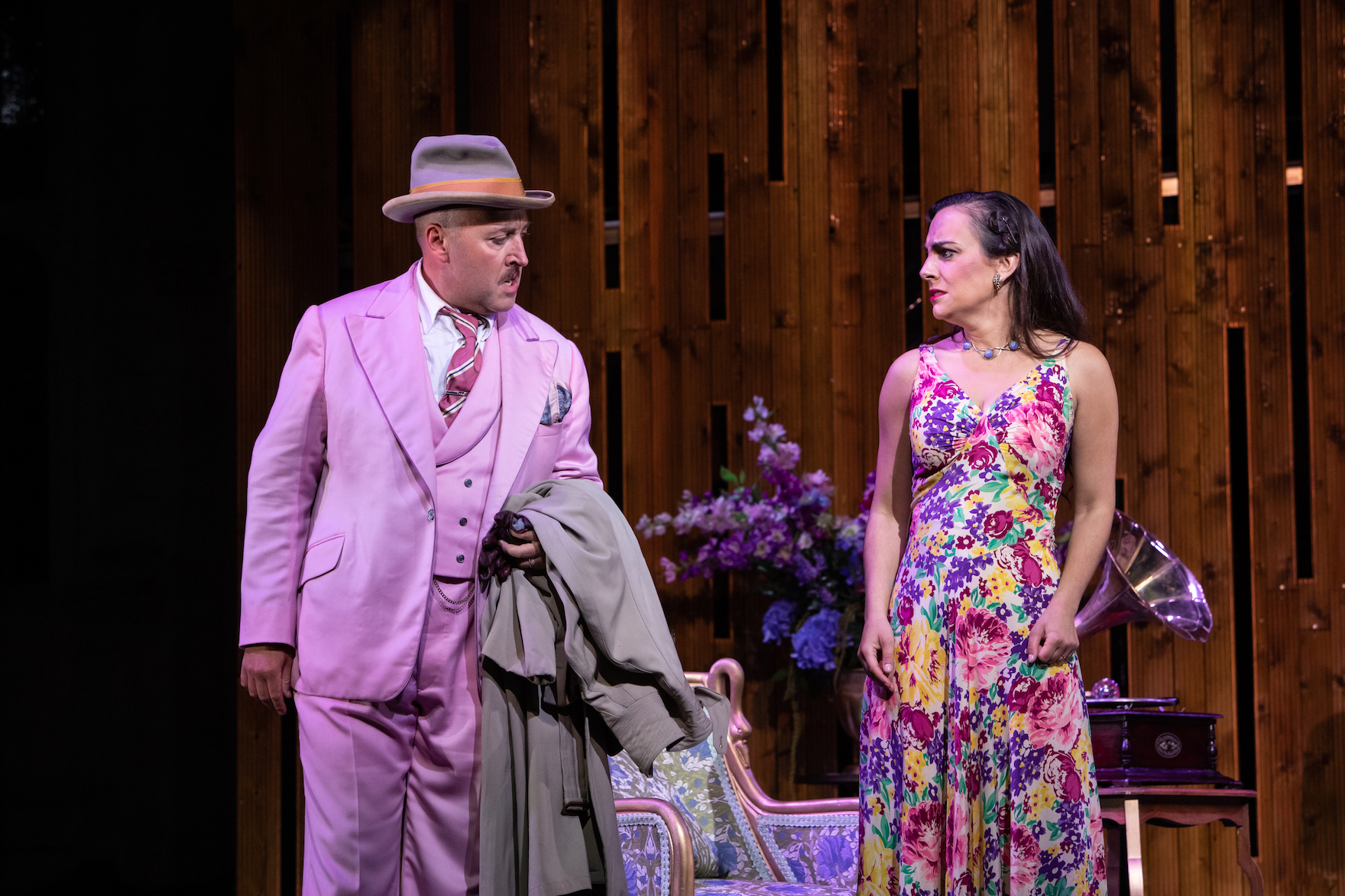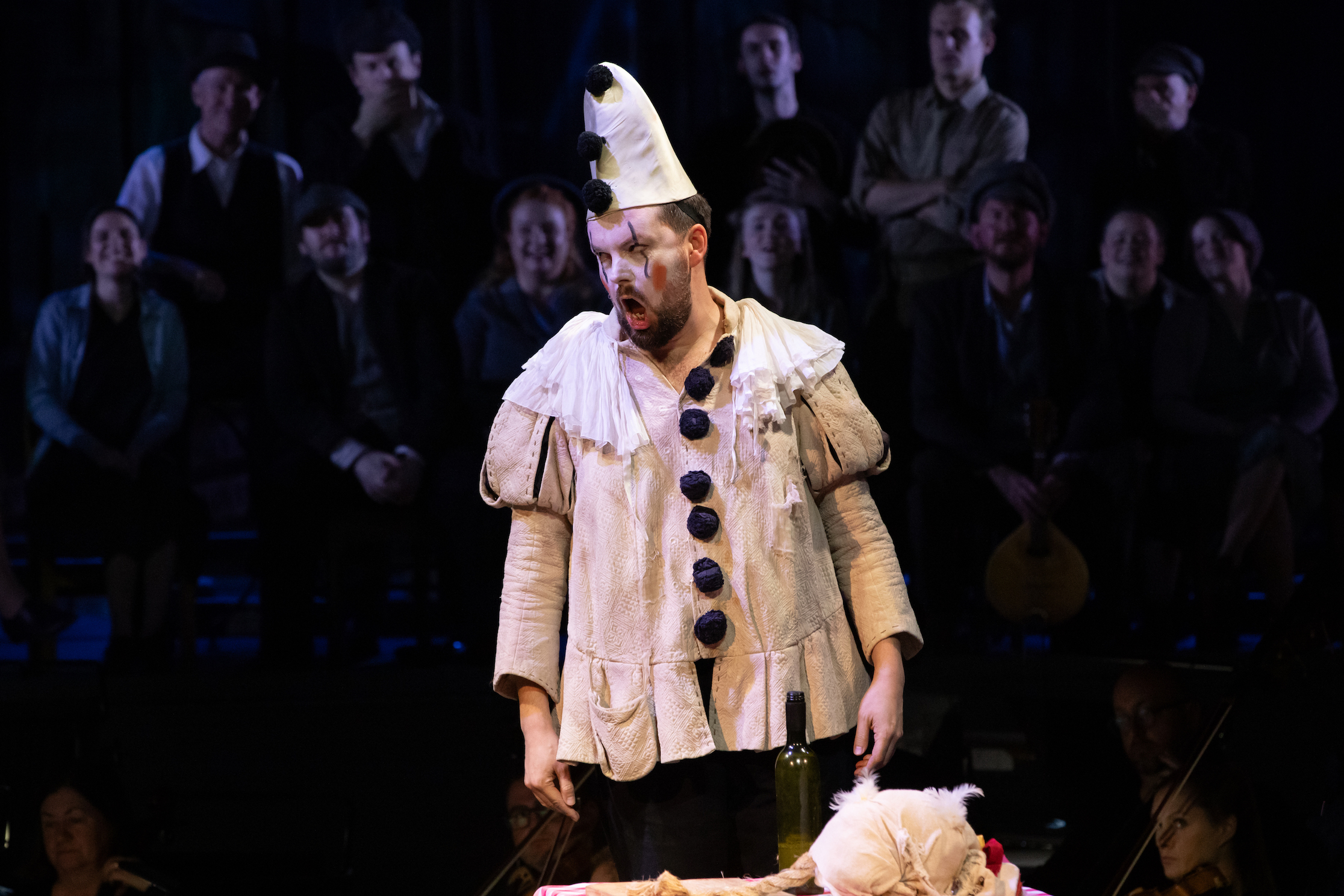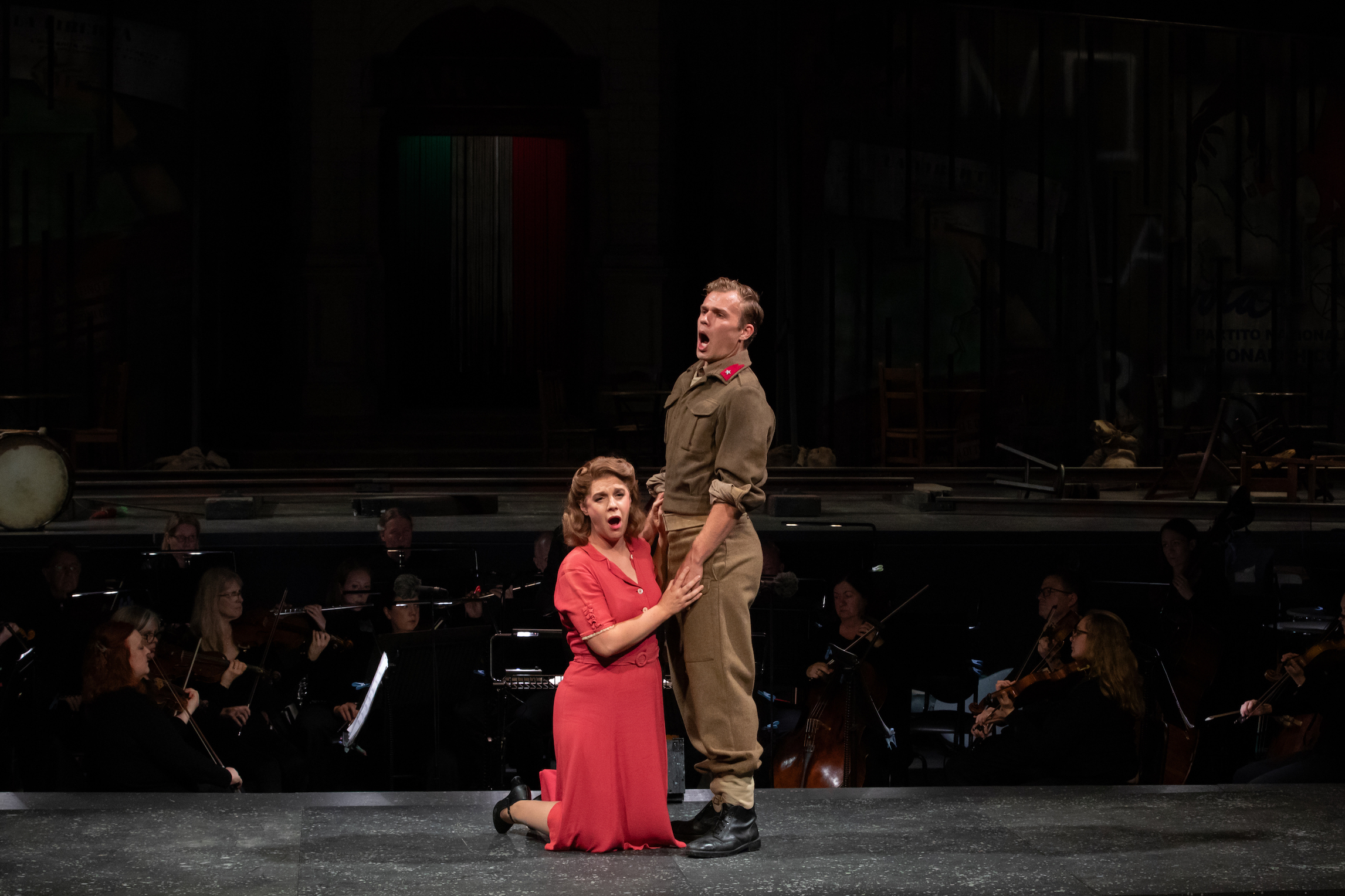Could “Cav and Pag” give way to “Sue and Pag”? As a double-bill partner for Leoncavallo’s backstage shocker Pagliacci, Opera Holland Park have scheduled not the standard Cavalleria Rusticana but an entirely different one-act work. Premiered in Munich in 1909, Wolf-Ferrari’s Il Segreto di Susanna plays droll, even farcical, variations on the same theme of male jealousy as newlywed Count Gil suspects his bride Countess Susanna of having an affair.
But the whiff of tobacco she brings into the lavish Art Deco apartment turns out to derive from her own cigarettes. The reconciled couple blissfully puff away together. Autres temps, autres moeurs. As my companion noted, probably more than half the Holland Park audience knew someone who has died or will die of smoking-related diseases (I certainly do). Yet here we are, chortling at the smoke-wreathed return of innocence to the marital home. Truly, drama suspends disbelief.
When, in Pagliacci, reality intrudes on performance as offstage passions break the fourth wall, not Carry On... comedy but gruesome violence ensues. The coupling of these pieces, both preoccupied with masquerade and both fuelled by male possessiveness, makes for a piquantly sweet-bitter evening. If, in the end, Wolf-Ferrari’s clever spun-sugar confection somewhat melts in close proximity to the blazing furnace of Leoncavallo’s verismo tragedy, all credit to OHP for this mind-stretching, and ear-pleasing, alignment. On with the motley, and out with the fags. John Wilkie’s production of Il Segreto di Susanna proved a hit on its initial outing in 2019. This revival, with its nicely detailed Twenties decor (designed by takis) and its Count in a lurid pink suit, reminds us from the off that this fairy-tale of domestic mix-ups and mishaps will wave a magic wand over any authentic human feelings that arise.
John Wilkie’s production of Il Segreto di Susanna proved a hit on its initial outing in 2019. This revival, with its nicely detailed Twenties decor (designed by takis) and its Count in a lurid pink suit, reminds us from the off that this fairy-tale of domestic mix-ups and mishaps will wave a magic wand over any authentic human feelings that arise.
Clare Presland, as Susanna, and Richard Burkhard’s Gil (pictured above), both do a fine job of treading this tightrope between frivolity and sincerity, play and truth. In Wolf-Ferrari’s deliciously sophisticated pastiche score, nods to Verdi, Bellini or Puccini finally yield, as Susanna lights up, to full-on Tristan-style ecstasy in the swooning strings.
His music calls for the principals to throw their heart into wittily crafted arias and duets of devotion or suspicion even as they (as it were) wink knowingly out at the audience. When Gil serenades Susanna with memories of the night they fell in love, or she pleads forgiveness for the scandalous “passion that neither willpower nor sense than master”, Presland and Burkhard smartly modified this lyric grace with the just right touch of deflating mischief. Prominent on the Holland Park stage, conductor John Andrews and the City of London Sinfonia found all the tang and relish in a score packs authentic – if, for 1909, nostalgic – grace and charm into its almost-parodic fun.
Meanwhile, as the non-singing servant Sante, John Savournin bustled and manoeuvred with a silent-movie agility. To have shown Susanna intimately involved not just with a clandestine box of Balkan sobranies but the wordless, unbiquitous Sante himself might have pushed this intermezzo deeper into Pagliacci territory. But we had enough turmoil in store... Updated a few decades from 1892, when it premiered, Martin Lloyd-Evans’s Pagliacci begins with the old clown Tonio’s ominous prologue as the troupe of actors haul their suitcases into this run-down Mezzogiorno town where they will ply their old-fashioned commedia del’arte trade. Lloyd-Evans, and designer Bridget Kimak, make effective use of OHP’s wide stage fronted by a sort of racetrack that circles the orchestra. Conducting, Francesco Cilluffo drew well-salted flavour and texture from the CLS, his unapologetically big, brash sound at climactic moments alternating with gently eloquent interlude from woods and strings. In set-piece crowd scenes, notably the bell-filled vespers, the excellent OHP chorus – along with ten busy child singers – helped fix a mood of bedraggled excitement.
Updated a few decades from 1892, when it premiered, Martin Lloyd-Evans’s Pagliacci begins with the old clown Tonio’s ominous prologue as the troupe of actors haul their suitcases into this run-down Mezzogiorno town where they will ply their old-fashioned commedia del’arte trade. Lloyd-Evans, and designer Bridget Kimak, make effective use of OHP’s wide stage fronted by a sort of racetrack that circles the orchestra. Conducting, Francesco Cilluffo drew well-salted flavour and texture from the CLS, his unapologetically big, brash sound at climactic moments alternating with gently eloquent interlude from woods and strings. In set-piece crowd scenes, notably the bell-filled vespers, the excellent OHP chorus – along with ten busy child singers – helped fix a mood of bedraggled excitement.
But Pagliacci stands or falls with its central quartet bound by love, fear and jealousy. As the tormented, betrayed clown Canio, David Butt Philip (pictured above) brought his world-class silk-and-steel tenor to Kensington. A traditional depth and sheen in the voice adds a glossy sweetness to his descent into murderous rage at the faithless Nedda. But, when it came to “Vesti la giubbia”, he tore off and trampled his hated costume with all the desperate asperity the aria requires.  In her dress of symbolic scarlet, Alison Langer’s Nedda has a worldly, imperious quality as she haughtily fights off the attention of the frail stick-dependent fool Tonio (Robert Hayward). Harsh at moments, elsewhere rich in bel canto lusciousness, Langer merged wilfulness and vulnerability in solo pieces such as Stridono lassù. Buffeted by contradictory desires, like her wind-blown model birds, her ambivalence colours the love-scene with Harry Thatcher’s fresh-voiced but fruity baritone as Silvio – here, a local stage-struck squaddie (pictured above with Alison Langer).
In her dress of symbolic scarlet, Alison Langer’s Nedda has a worldly, imperious quality as she haughtily fights off the attention of the frail stick-dependent fool Tonio (Robert Hayward). Harsh at moments, elsewhere rich in bel canto lusciousness, Langer merged wilfulness and vulnerability in solo pieces such as Stridono lassù. Buffeted by contradictory desires, like her wind-blown model birds, her ambivalence colours the love-scene with Harry Thatcher’s fresh-voiced but fruity baritone as Silvio – here, a local stage-struck squaddie (pictured above with Alison Langer).
ln the play-within-a-play, as Canio’s jealousy smashes the barrier between art and life, we first see Nedda, as Columbine, in silhouette. Behind a backcloth, she faces away from us and towards the onstage audience. That cloth periodically – and maybe too intrusively – drops as real and acted passions blur.
Butt Philip can never disguise the underlying beauty of his tone but manages to sharpen an edge of scary fury in the voice as the fatal breakdown nears. Hayward’s Tonio, his voice well-polished gravel, feels unusually sympathetic when Nedda spurns his age and disability. He grows in sinister stature as the arch-manipulator while farce and horror seesaw through the performance, with an attractive cameo from Zwakele Tshabalala’s Beppe as Canio’s (purely on-stage) rival.
Holland Park’s broad spaces allow plenty of flexibility in movement around playing areas – but one result was that, from my seat, the gory climax was scarcely visible. Never mind: Butt Philip lent to Canio’s misogynistic rage an air of proper terror as well as aching pathos. La commedia è finita, but potentially lethal male insecurity endures. These days, not even a soothing smoke can calm its fears.














Add comment